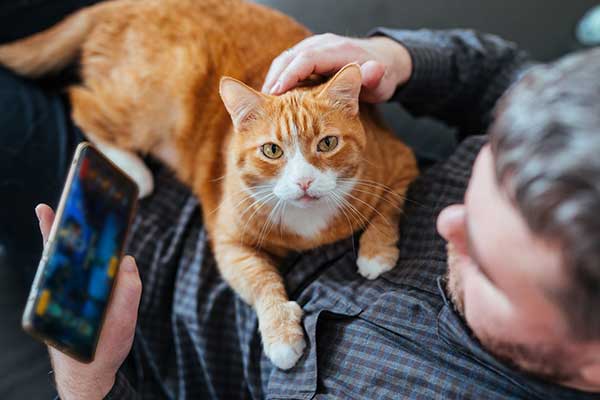
For the longest time, cats had a somewhat negative reputation regarding animal affection. Dogs got all the credit for being astute to emotional changes in owners.
It’s no question that dogs pick up on body language, facial expressions, and general demeanor. But what about cats? Are they the uncaring and aloof creatures people like to say they are?
If you’re a cat owner, you already know how affectionate these animals can be. Contrary to what some might believe, cats aren’t insensitive or heartless. They’re surprisingly perceptive and are fully capable of developing strong bonds with their owners.
So, can they sense sadness?
To answer that question, we have to understand how cats relate to their owners.
The Relationship Between Cats and Cat Owners
There’s no doubt that cats get a bad rep among those who don’t have one. But you know just as well as other cat owners that these felines can be quite loving.
Recent studies are giving us more insight into how cats behave and how they form bonds with humans.
While cats can be somewhat aloof, they do learn how to identify their caretakers. Like any other animal, cats can take time to warm up to you. But, their bond will grow with time.
A good way to tell if your cat has a secure connection with you is to see how they react when you arrive home. Do they run up to you and follow you around for a few minutes? Or do they completely ignore you?
If your cat greets you, you’re in luck! Your bond is already pretty strong, and there’s a good chance that your cat has some positive feelings about you.
But that’s not the only way cats relate to humans.
Identifying Your Voice
Believe it or not, cats can distinguish your voice from another person. You might not realize it in an everyday setting. Cats love to ignore calls and do their own thing!
However, a controlled study showed that cats respond strongly to their owners calling their names versus a stranger.
They don’t always come to you or even look your way. But subtle signs like changing the position of their ears or tilting the head are clear-cut indicators that they know it’s you!
Engaging in Play
Another sign that cats love to spend time with the humans they connect with the most. Again, it’s not always obvious. Cats can be an enigma.
But when it comes to their willingness to engage with strangers, the difference is obvious.
Cats are more likely to pay attention to you than someone they don’t know. Plus, they’re more open to playing and positive interaction.
Related: Why Does My Cat Lay on My Chest
Missing You When You’re Gone
The last important indicator of your cat’s relationship with you is how they act when you’re gone. Most people attribute separation anxiety to dogs. However, cats can suffer from it, too!
They get upset when you’re gone for too long. Like a toddler missing his mom, your cat can throw a tantrum and exhibit all kinds of oddball behaviors.
The most common signs of separation anxiety include destructive behavior, excessive grooming, and vocalizations.
Of course, this form of anxiety is never a good thing. You may want to visit a trainer or behaviorist if you suspect that your cat suffers from separation anxiety.
That said, it should make you feel more confident about your relationship with your cat. If they’re going through it when you’re gone, you obviously mean a lot to them!
Do Cats Know When You’re Sad?

Cats do care about their humans. They know how to identify you and generally like to be around you. We know that much despite their hesitation to show it sometimes.
Felines might be mysterious, but they are perceptive of their surroundings. They can pick up on things humans can’t, making them less detached than they might come off.
You’re a big part of your cat’s life. You spend tons of time together, so they can easily pick up on cues that indicate what you’re feeling.
Emotional Copycats
Did you know that cats look to you to manage their own emotions? They’re masters of mimicry and will often pick up on how you react to situations.
Take, for example, a new experience or stimuli they’ve never been around. If you act cool and collected around it, your cat will probably do the same.
Owners often experience that when they bring a new person or pet into the home. As long as you react with warmth and calm, your cat will do the same.
The opposite applies as well. If you suddenly jump up at the sight of a huge cockroach scurrying through the room, your cat will probably flee in terror! It’s all about mimicking your actions and emotions.
Your cat relies on you to know what to be scared of at any given moment. Act fearful, and your cat follows. Act sad, and your feline friend will take notice.
Don’t assume that your cat is uncaring because they like to be alone. They’re more than capable of identifying your emotions.
Reading Your Body Language
Another part of understanding your emotions is reading your body language. Think about how you act when you’re sad.
If you’re like most people, your entire posture changes! Instead of standing or sitting upright, you might slouch more often.
Your head might hang low as you try to deal with tears running down your face. Some people even go into the fetal position, curling up on the couch or bed.
All of those behaviors are starkly different from what you usually do. They’re out-of-the-ordinary actions your cat can’t help but notice. Your cat might go in to investigate, seeing other signs of sadness that paint a clear picture of what you’re feeling.
Even if your cat doesn’t pick up on things right away, it’s only a matter of time. Say, for example, that your sadness forces you to stay in bed for hours on end.
Your cat will notice your absence. Don’t be surprised if they come into bed with you and offer signs of support.
Cats see bedtime as a call for cuddles and care. Their instincts take over, and they might start rubbing themselves on you, asking for pets, or even massaging your body.
It’s an admirable effort that they pick up on because of your change in body language and behavior.
Related: Why Does My Cat Reach His Paw Out to Me?
Connecting Facial Expressions
Finally, cats can tell you’re sad by looking at your face.
Reading your facial expressions is something that comes with time. Cats aren’t born with that ability, but they learn it through interactions with you. Think of it as a subconscious form of training.
When you play with your cat, you are probably all smiles. Even your voice will change to a higher-pitched tone. If you give your cat a treat or some loving, you likely have a cheery expression.
Those interactions help your cat create a connection with smiles and positive things like treats and playtime.
So when things are suddenly different, your cat will take notice. Frowns and crying are a big difference from the happy smiles they know. Your cat might not understand what those expressions mean, but they know it’s different.
If you’ve ever scolded your cat, they might recognize some of your emotions. Once again, they learned the negative connection.
Do Cats Express Sadness?
Cats don’t just express sadness. They can have a full range of emotions! That includes fear, anger, and even joy!
When cats feel down, you might notice them acting more detached than ever. They’ll avoid socialization, spend more time sleeping, and might even avoid their food dish for a while.
Sadness is a strong emotion, and cats can fall into a depression after traumatic events. You’re more likely to see signs of sadness after losing a companion.
However, some cats may get sad after moving homes, losing a toy, or general loneliness.
How Cats Can Respond to Your Emotions
When your cat notices that you’re sad, its reaction can vary. Ultimately, the relationship it has with you will be the biggest factor.
If your cat is still relatively new, it might not have that strong bond just yet. Don’t worry; you’ll get there!
If you already share a strong connection with your cat, they might go to great lengths to distract you. Most cats go into protection mode. They don’t know what’s causing you harm, but they know they want to keep you safe.
So, they stay by your side. Many cats will get extra clingy when they notice their owners are sad. In addition to cuddling, they might stand watch over you until you show signs of getting better.
Related: Why Won’t My Cat Let Me Sleep Through the Night?
Conclusion
Cats don’t deserve the unfair reputation they get. Sure, they’re independent and like to do things on their own. But cats can be just as affectional and in-tune with your emotions as dogs!
Your feline friend is fully capable of knowing when you’re sad. They pick up on body language, facial expressions, and an overall change in demeanor. Depending on your relationship,
it might try to comfort you. Enjoy the affection! Your cat loves you and wants you to get better. It might not understand the extent of your problems, but it certainly recognizes them.
Also Read:

